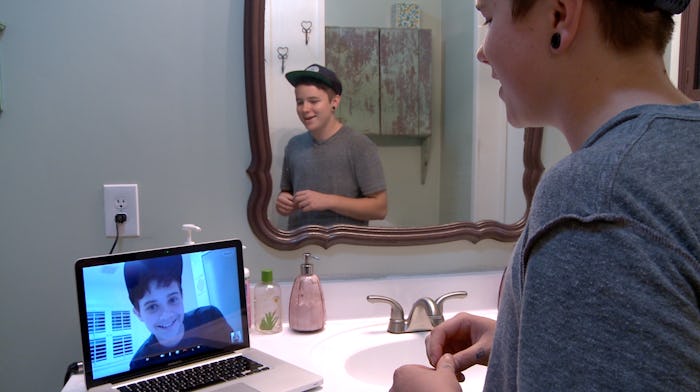Entertainment

What It's Like To Raise A Trans Boy In 2017
“I was a tomboy,” Bennett Wallace says while looking at photos from his youth. In most of the images, he has short hair and wears boys' clothes. The photos were taken before Bennett hit puberty, when he struggled with the natural changes that his body was undergoing. Eventually, he came out as transgender and transitioned when he was a teenager. Bennett’s journey is recounted in a new documentary, which highlights both Bennett's transition and his mother Suzy's experience of raising a transgender boy.
Real Boy, which airs June 19 on PBS, recounts Bennett's struggle with gender dysphoria, the clinical term used to describe the incongruence between a person’s internal sense of their own gender and their assigned sex at birth. The documentary also explores Bennett’s recovery from alcoholism, his double mastectomy (which is commonly referred to as "top surgery") and his relationship with Joe Stevens, an older trans man and musician who also had a history with substance abuse.
In an age when transgender people are facing prejudice in the form of anti-LGBTQ legislation and even mainstream media outlets like the New York Times have been accused of fueling parental anxiety about transgender children, it's never been more important to highlight the actual experiences of non-gender-conforming children. Real Boy gives us a rare glimpse into what can happen when trans children don’t get the chance to transition and live their truths.
Few subjects are more controversial than the discussion of transgender children. Mothers of transgender children are frequently demonized for allowing their children to express their gender identity, and many conservatives have claimed that such parents are needlessly medicalizing children who don’t conform to traditional gender roles. Such children, the argument goes, are simply "effeminate" or "tomboys." A controversial New York Times op-ed by Lisa Selin Davis recently reignited this debate. In the piece, "My Daughter Is Not Transgender. She's A Tomboy," Davis argued that her 7-year-old daughter shouldn't be misgendered just because she doesn't adhere to traditional gender roles.
It's true that for those who are assigned female at birth and identify as female, like Davis's daughter, there can be a certain level of empowerment in being a tomboy. Many adult women fondly recall their days of playing in the dirt and showing what they can do on the athletic field. But for trans boys like Bennett, however, the tomboy identity is often a way to experiment with masculinity and an opportunity for self-discovery (a luxury that, it's worth noting, is not afforded to young girls who are assigned male at birth, who are often bullied and deemed effeminate). There’s truth to be learned from Bennett’s journey, portrayed so vividly in Real Boy.
“I just wanted to let my child be who they wanted to be."
In an interview with Romper, Bennett's mother Suzy Reinke explained how she came to the realization that her child wasn't just a "tomboy."
“We had so many issues [during] puberty that we didn’t tie to the tomboy stuff, because Bennett got a boyfriend and I went ‘Whew, dodged a bullet!’," Reinke told Romper. "But I think that was normal experimentation and trying to fit into today’s norms.”
In high school, Bennett came out as gay. “I thanked god, because I thought he was going to say that he was trans,” Reinke recalled. While she wanted her child to be happy, she understood that a transition would be difficult for Bennett and her family in the long run. Then, “six months later, he came to me and said he was trans.”
Before Bennett transitioned, Reinke said, he engaged in a series of self destructive behaviors, including substance abuse. “What the movie doesn’t show was the tumultuous three or four years of the acting out behaviors and drug use,” she said.
Bennett is not alone: many transgender people have a history of substance abuse and eating disorders, which they often attribute to their gender dysphoria. These struggles reflect the reality that for trans kids, the price of not transitioning can be extremely high: according to a 2014 National Transgender Discrimination Survey, more than 40% of transgender people will attempt suicide in their lives, which is why treatment for trans children is vitally important.
"The most important thing is to make sure that your child is happy with who they are.”
Thanks to a gradually changing cultural climate, Reinke says that things are slowly improving for trans children in America. “I think in some areas of the U.S. and other countries, people are evolving in the right direction and realizing that we should be more compassionate and open," she told Romper. But progress isn’t constant. In February, for instance, the Department of Education under the Trump administration moved to eliminate Obama-era Title IX protections for trans schoolchildren, which could result in increased bullying of transgender children in schools.
In the end, amidst all of the talking points and discussion surrounding transgender children, Real Boy's message is that it’s critically important to listen to trans people and their parents. Real Boy shows that with enough patience, love, parental support, and professional guidance, transgender kids can become incredibly well-adjusted adults. They simply just need to be given the chance to live their truths.
For Reinke, that meant giving up a little control and letting her child be the man he knew himself to be.
“It was always in the back of my mind [that Bennett might be trans]. But you just never know,” she said. “I just wanted to let my child be who they wanted to be and just wait and see. The most important thing is to make sure that your child is happy with who they are.”
Real Boy airs June 19 on PBS at 10:00 p.m. EST.